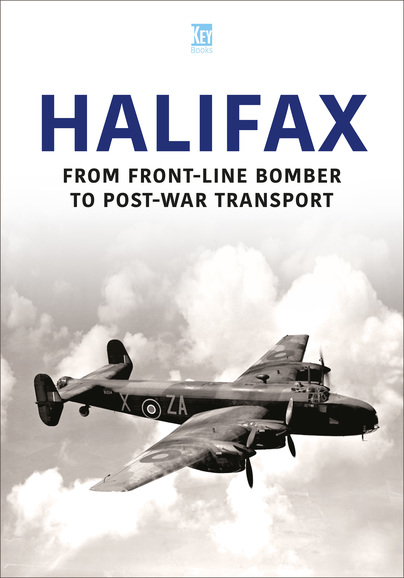
- aviationmegastore.com
- aviationoutletstore.com
- Ship to United States
Quick Search – Outlet Store
Aviation Outlet Store
categoriesHalifax: From Front-Line Bomber to Post-War Transport
Product code 9781802824773
€ 22.89
Series Historic Military Aircraft 29
Publisher/Brand Key Publishing
Format 24 cm x 17 cm
No. Pages 96
Version Soft cover
Language English
Category Aviationbooks
Subcategory WW2 UK » WW2 UK Aircraft
Availability only 3 remaining
This product was added to our database on Monday 30 October 2023.
Your reliable Aviation Book Source since 1989
Also in this series:
| product | Publisher/Brand | Series/scale | Price € | ||
 | Avro Vulcan: The Early Years, 1947–1964 | Key Publishing | Historic Military Aircraft 7 | € 21.06 | |
 | B-24 Liberator: Combat Photograhs from the Mediterranean Theater of War | Key Publishing | Historic Military Aircraft 33 | € 22.89 | |
 | British Bombers of the 1970s and '80s | Key Publishing | Historic Military Aircraft 4 | € 18.30 | |
 | British Fighters of the 1970s and '80s | Key Publishing | Historic Military Aircraft 2 | € 21.06 | |
 | AviationOutletstore.com British Ground-Attack Aircraft of the 1970s and 1980s | Key Publishing | Historic Military Aircraft 8 | € 13.72 | |
 | F-111: Fort Worth Swinger | Key Publishing | Historic Military Aircraft 3 | € 21.06 | |
 | German Starfighters: The Story in Colour: Introduction and Units | Key Publishing | Historic Military Aircraft 24 | € 21.06 | |
 | Junkers Ju 88 | Key Publishing | Historic Military Aircraft 15 | € 21.06 | |
 | Swordfish Fairey's Successful Torpedo-bomber | Key Publishing | Historic Military Aircraft 28 | € 22.89 | |
 | Vampire | Key Publishing | Historic Military Aircraft 26 | € 21.06 |
Product description
One of the three British four-engine heavy bombers that took the fight to Germany, the Handley Page Halifax contributed in no small way to the destruction and ultimate surrender of the Third Reich. However, in its early years from service entry in March 1941, little good could be said about the Halifax. All round it was a poor design from Britain's most famous builder of big bombers. In fact, it was so bad that 'Bomber' Harris wanted it withdrawn from service and production switched in favour of the Lancaster. However, there was simply no time or money to switch to building a new machine. Instead, Handley Page designers struggled to improve the aircraft and it was a good two years before they succeeded. The new Halifax was worth waiting for. By late 1944, Halifax losses dropped below those of the Lancaster, even though the former often outnumbered the latter on some of the big raids.
Those who flew and maintained the Halifax were largely loyal to the type, particularly the Canadians, who operated 15 squadrons. Its early difficulties overcome, the design was found ideal for other tasks – towing gliders, carrying troops, stuffing the fuselage full of electronics to spook the enemy, anti-submarine patrollers, spy dropping and, in the post-war world, flying early civil air routes around Europe and helping to sustain Berlin against the Russians. This new book edition of Aeroplane Icons: Halifax reviews the lows and highs of the mighty Halifax and recounts its contribution to the Allied success in winning World War Two.
Shopping cart
Your shopping cart is empty.
Login
Already a customer on our main website AviationMegastore.com? Your login is also valid in the outlet store.
- aviationshopsupplies.com
- aviationmegatrade.com
© 1989–2025 Luchtvaart Hobby Shop B.V.